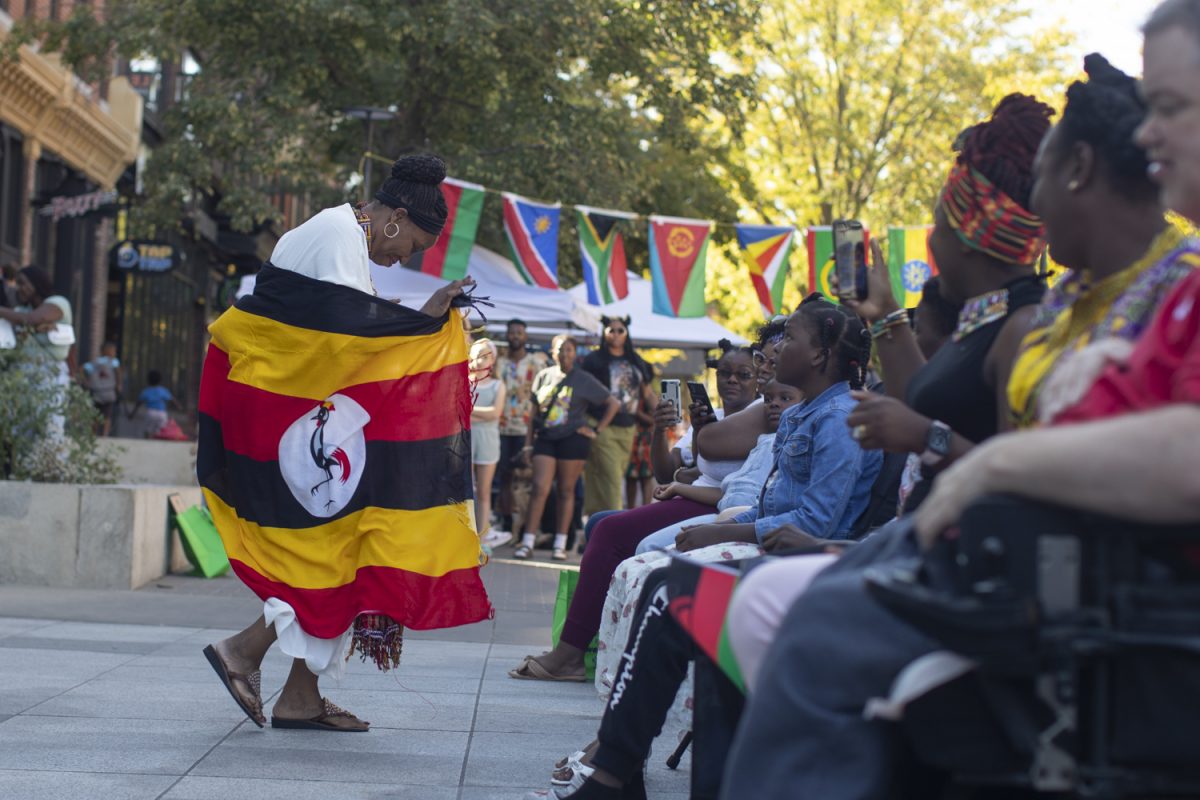Looking around his classroom over two decades ago, Sunday Goshit did not see many students who looked like him.
Goshit came to Iowa City from Nigeria for graduate school around 24 years ago. He said he has been involved with the local African community ever since he set foot on Iowa soil.
While he has watched the community grow exponentially over the years, Goshit said some individuals in Iowa City’s burgeoning African population felt it was lacking something important: an event to showcase the continent’s culture and bring those from it together in one place.
This is how the idea for this year’s first Africa Fest originated. Goshit, the chair of the festival’s planning committee, and the other members and organizations involved in the festival spent months planning the event that would allow Iowa City residents to experience Africa’s rich culture.
The festival came to fruition on Saturday, Sept. 28.
Iowa City’s Pedestrian Mall was transformed into an invigorating atmosphere filled with upbeat music, laughter, and foods from various African countries.
In front of the Graduate Hotel, artists and performers of all kinds took the stage. Poets, jugglers, dancers, singers, and bicyclist tricksters showed off their many talents.
Walking down the Ped Mall, lines of booths were set up, with signs representing the associated artist’s identity. Clothing racks, beaded handbags, and dazzling jewelry caught attendees’ eyes as they walked by.
Fatima Saeed, a Sudanese immigrant who’s lived in Iowa City for over 20 years, works as a painter. She donates 45 percent of her profits to various organizations, specifically those that support underprivileged African towns and fund disaster relief.
“I helped raise money to build a school in Kenya for refugees with the [United Nations] because I used to be on the board with the Johnson County chapter,” Saeed said. “Now, Sudan is going through war. I support a lot of families, kids who have been orphaned…medicine, shelter…I sell this art to help these people and send a lot of money to help them.”
In addition to helping people, Saeed is inspired to share her culture and learn more about other cultures.
“I like to share ideas because there are a lot of different traditions between Iowans and Sudanese,” she said. “Therefore, this festival provided a great opportunity to learn more about Sudanese culture along with other cultures across Africa.”
This festival transcended generational gaps and provided a space for African descendants to simultaneously come together to embrace their commonalities and celebrate the diverse cultures that enrich the continent of Africa.
The African community in Iowa has seen rapid growth over the years. According to the Migration Policy Institute, the African-born population in Iowa went from under 4,000 residents in 2000 to over 32,500 residents 22 years later. Iowa’s total population in 2022 was over 3.2 million.
As the African population in the state grew, Iowa City became a place that was attractive for immigrants because of the University of Iowa — specifically its smaller size, slower pace, and affordability, Goshit said. According to 2022 data, nearly 10 percent of Iowa City’s population — or over 17,000 residents — were born outside of the U.S.
Mawuena Morgan, a ceramic BFA and education major at the UI, described their experience as a first-generation Ghanaian, who was born and raised in Iowa as positive.
RELATED: The Stanley Museum made history this summer with the restitution of Benin Bronzes
“This is the community event for me, and I’m just hoping that we have more and more and more,” Morgan said.
Moreover, they emphasized the importance of the event and how its presence provides a place of belonging for African American and Black Iowans.
“I think, culturally, Black culture and African American culture is surrounded by noise, like music, poetry, conversations, laughter — there’s always something being said, and I say that in the most positive way,” Morgan said. “It brings me joy to think about the loudness of a cookout, a birthday party, a graduation party, and these Black spaces. I like that these events give us space to be loud and laugh and laugh really hard for a long time.”
Goshit said African culture is about community and helping each other out in times of need. In Iowa City, many immigrants from Africa’s countries have formed informal neighborhood associations to meet periodically and support each other through challenges, he said.
Saturday’s festival was a chance to show this communal culture to Iowans, Goshit said.
“I think that bringing that aspect of the African culture here has been able to make [African immigrants] be able to adjust easier,” he said. “And that is something that I, for one, who is involved in organizing, would love to see that they continue to encourage — in fact, to even teach native Iowans that this is our culture.”
The African community has cemented itself in Iowa City, not only through raising their families here but also by starting businesses. Bukiwa Ansele came to Iowa from the Democratic Republic of the Congo in 1994 and has lived in Iowa City since 1995. She said she has seen African grocery stores, churches, and clothing stores crop up in the city over the years.
While African immigrants and refugees have lived and worked in Iowa City for quite some time, Ansele said Africa Fest has finally given them a chance to show the city who they are.



